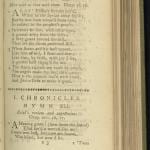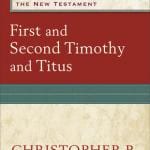You might be familiar with John Locke’s famous treatise A Letter Concerning Toleration (1689), but a new manuscript has been discovered by Locke on The Toleration of Catholics (1667-68) which allegedly precedes his famous work on toleration.
See J. C. WALMSLEY and FELIX WALDMANN, “JOHN LOCKE AND THE TOLERATION OF CATHOLICS: A NEW MANUSCRIPT,” The Historical Journal (2019).
The following Communication presents a newly discovered manuscript by John Locke. The manuscript dates from 1667–8 and it deserves notice as the most significant example of Locke’s thought on the toleration of Catholics prior to the Epistola de tolerantia (1689). The manuscript, entitled Reasons for tolerateing Papists equally with others, reveals Locke’s engagement with Sir Charles Wolseley’s Liberty of conscience, the magistrates interest (1668) and significantly informs the compositional history of Locke’s Essay concerning toleration (1667–8).
According to the transcription, Locke concludes his argument:
I doubt whether upon Protestant principles we can justifie punishing of Papists for their speculative opinions as Purgatory transubstantiation &c if they stopd there. But possibly noe reason nor religion obleiges us to tolerate those whose practicall principles necessarily lead them to the eager persecution of all opinions, & the utter destruction of all societys but their owne. soe that it is not the difference of their opinion in religion, or of their ceremonys in worship; but their dangerous & factious tenents in reference to the state. which are blended with & make a part of their religion that excludes them from the benefit of toleration · who would thinke it fit to tolerate either presbiterian or Independant, if they made it a part of their religion to pay an implicit subjection to a forraigne infallible power? Severity to Papists only, cannot make them unite with any other party. nor toleration disunite them among them selves.
I have to confess that I’ve always been a little concerned and frightened by the pathological hatred of Catholics exhibited in the media and by politicians. In such a context, Joseph Loconte’s article in National Review gives some good reasons why we need a good dose of Lockean liberalism today:
Today we take political stability and civil order for granted; we do not exist in fear of sectarian forces sweeping away our liberties. But no one living in Locke’s tumultuous times enjoyed this luxury. Some ideas threatened the moral taproot of civil society; they could not be tolerated. In Locke’s world — as in ours — the constitution must not become a suicide pact. Political philosopher Greg Forster insightfully observes that Locke “towers over the history of liberalism precisely because virtually everything he wrote was directed at coping with the problem that gave birth to liberalism — religious violence and moral discord.”
Such is the world as we find it. If prejudice taints Locke’s political legacy, perhaps it is the prejudice of those who prefer false and comforting narratives to difficult moral and historical realities. Locke’s critics have blinded themselves to the bracing nature of his democratic vision: “But those whose doctrine is peaceable, and whose manners are pure and blameless, ought to be upon equal terms with their fellow-subjects.” Here is the only tenable solution to the challenge of religious diversity: equal justice under the law for people of all faith traditions.
No political doctrine has been more integral to the success of the United States, for no nation has been so determined to regard religious pluralism as a source of cultural strength. America’s experiment in human liberty and equality is profoundly Lockean. It is also, in some important respects, deeply Christian. Locke believed that the gospel message of divine mercy — intended for all — implied political liberalism. The founder of Christianity, he wrote, “opened the kingdom of heaven to all equally, who believed in him, without any the least distinction of nation, blood, profession, or religion.”
It would be hard to conceive of a better doctrine on which to build a more just and humane society. A revival of Lockean liberalism would do much to tame the hatreds now afflicting the soul of the West.
Photo from Wikimedia.












